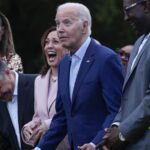Is it unreasonable to exclude non-citizens from voting in elections in the United States? Some nations do allow limited non-citizen suffrage. But we aren’t “some nations.” We are the United States of America, and we should not compare ourselves against other nations; we should do what is right for our citizens before worrying about the citizens of other countries.
This brings us to Vermont, where the city of Burlington has a municipal ordinance allowing non-citizens to vote in city and school board elections. The Republican National Committee (RNC) and the group Restoring Integrity and Trust in Elections (RITE) have filed a lawsuit to block this practice, which has been under litigation for some time.
In 2023, Burlington amended its city charter to allow noncitizens — who are legal residents in the U.S., Burlington residents and at least 18 years old — to vote in all local elections. This includes school board elections and votes on the city’s annual education budget.
The plaintiffs Michele Morin and Karen Rowell — U.S. citizens and active voters in Burlington elections — specifically target the city amendment’s provision about education elections.
They argue that while the school district’s budget is voted on locally, it’s funded by the state, so this provision violates the Vermont Constitution, which requires someone to be a U.S. citizen to vote on “any matter that concerns the State of Vermont.”
Morin and Rowell also argue that their votes will be diluted by noncitizen votes, meaning that their votes will have less impact on the election results.
The United States Constitution gives broad authority over elections to the states, specifically to the state legislatures. This ordinance was not passed by the state legislature of Vermont, which would seem problematic; also, the Vermont state constitution sets forth specific requirements for voting. Section 42, “Voter’s qualification and oath,” states in part:
Every person of the full age of eighteen years who is a citizen of the United States, having resided in this State for the period established by the General Assembly and who is of a quiet and peaceable behavior, and will take the following oath or affirmation, shall be entitled to all the privileges of a voter of this state:
And (following the required oath):
Every person who will attain the full age of eighteen years by the date of the general election who is a citizen of the United States, having resided in this State for the period established by the General Assembly and who is of a quiet and peaceable behavior, and will take the oath or affirmation set forth in this section, shall be entitled to vote in the primary election.
That seems pretty clear, but the City of Burlington doesn’t see it that way.
See Related: Secretaries of State From Arizona, Georgia Trade Barbs on Noncitizen Voting, Voter ID
The legalities will be fought out in the courts, obviously, but there is a moral element involved as well, one that cannot be decided in a courtroom but must be decided by the citizens, and that is, why should non-citizens have the same say in matters involving local governments as citizens? There are arguments to be made for both sides, granted; non-citizens may be long-term residents of the city, they pay taxes, and their children may attend the same schools as citizens; one could argue that they have the right to some say in how their tax dollars are spent.
There is also an argument for election integrity. Voting, one could argue, should be restricted to citizens. At the federal level, the franchise is (supposedly; one hears tales) limited to American citizens. If one intends to participate in civic life, it’s not too much to ask to undergo the requirements to become a citizen.
Vermont’s constitution prohibits non-citizen voting, though, in the requirements for being a voter. That would seem to preclude these laws in Burlington and other cities in Vermont, but again, the cities — and others around the country — don’t see it that way.
Like so many issues of our time, it looks like this will have to be fought out in the courts. You can view the entire Vermont Superior Court complaint (pdf) in this case here.


